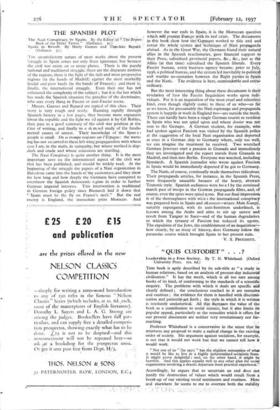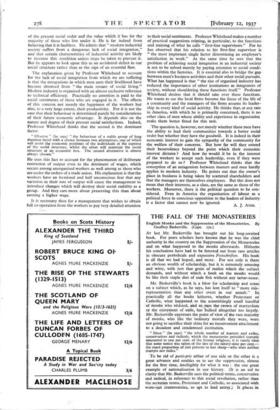" QUIS CUSTODIET " . . .?
Tins book is aptly described by its sub-title as "a study in human relations, based on an analysis of present-day industrial civilisation." It has the merit, which is all too rare among books of its kind, of conforming to the standards of a scientific enquiry. The problems with which it deals are specific aid clearly defined ; the conclusions reached in it are tentative and cautious ; the evidence for them is handled with discrimit- nation and patientlnset forth ; the style in which it is written is resolutely unrhetoric,aL All this &creases the value of the
book as a contribution to social itientie, but it also limits • its popular appeal, particularly as the remedies which it offers for
our present discontent are neither very revolutionary nor far- reaching. • -•
Professor Whitehead is a conservative in the sense that he mistrusts any proposal to make a radical change in the existing order of society. His argument against socialism, for example, is not that it would not work but that we cannot tell how it would work.
" Not one of us " (he says) a has the slightest conception of what it would be like to live in a -highly industrialised socialistic State. It 'night prove delightfiil ; and, -on the other hand, it- might be horrible. And this applies equally well to any other plan for social organisation involving a drastic departure from practical experience."
Accordingly, he argues that so uncertain an end does not justify the destruction of values which would result from a break-up of our existing social sentiments and routines. I-fere and elsewhere he seems to me to overrate both the stability of the present social order and the value which it has for the majority of those who live under it. He is far indeed from believing that it is faultless. He admits that " modern industrial society suffers from a dangerous lack of social integration," and that certain characteristics of industrial activity are likely to increase this condition unless steps be taken to prevent it. But he appears to look upon this as an accidental defect in our social structure rather than as the sign of an essential flaw.
The explanation given by Professor Whitehead to account for the lack of social integration from which we are suffering is that the occupations in which men earn their livelihood have become divorced from " the main stream of social living."
Modern industry is organised with an almost exclusive reference to technical efficiency. Practically no attention is paid to the social sentiments of those who arc engaged in it. The effects
of this concern not merely the happiness of the workers but also, to a very large extent, their productivity. For it is not the case that their behaviour is determined purely by considerations of their future economic advantage. It depends also on the nature and degree of their present social satisfactions. Indeed,
Professor Whitehead thinks that the second is the dominant factor.
" Observe " (he says) " the behaviour of a stable group of long duration faced with a choice between two alternatives, one of which will assist the economic positions of the individuals at the expense of the social structure, whilst the other will maintain the social structure at an economic loss. The second alternative is almost always chosen."
He uses this fact to account for the phenomenon of deliberate restriction of output even to the detriment of wages, which occurs among unorganised workers as well among as those who are under the orders of a trade union. His explanation is that the workers have an irrational and half unconscious fear that any variation in their rate of output will cause the management to
introduce changes which will destroy their social stability as a group. And they care more about preserving this than about earning a higher wage.
It is necessary then for a management that wishes to obtain full co-operation from the workers to pay very detailed attention
to their social sentiments. Professor Whitehead makes a number of practical suggestions relating, in particular, to the functions and training of what he calls " first-line supervisors." For he has observed that his relation to his first-line supervisor is " the most impbrtant single factor determining an employee's satisfaction in work." At the same time he sees that the problem of achieving social integration in an industrial society is not to be solved merely by paying attention to social condi- tions within the factories. It is essential also to bridge the gap between men's business activities and their other social pursuits. What has happened is that " the rise of organised industry has reduced the importance of other institutions as integrators of society, without shouldering these functions itself." Professor Whitehead desires that it shduld take over these functions. He wants to see the local firms become the focus of the life of a community and the managers of the firms assume its leader- ship in every kind of social activity. He thinks that, at any rate in America, with which he is primarily concerned, there is no other class of men whose ability and experience in organisation make them better fitted for this task.
The question is, however, not merely whether these men have the ability to lead their communities towards a better social order but whether they have the goodwill. It is indeed in their economic interest to gain the sympathy of the community for the welfare of their concerns. But how far will they extend their benevolence beyond the point which their economic interest dictates ? And how far would it be in the interest of the workers to accept such leadership, even if they were prepared to do so ? Professor Whitehead thinks that the conception of an antagonism between masters and men hardly applies to modern industry. He points out that the owner's place in business is being taken by scattered shareholders and that the managers are themselves employees. But this does not mean that their interests, as a class, are the same as those of the workers. Moreover, there is the political question to be con- sidered. Even in America the organisation of labour as a political force in conscious opposition to the leaders of industry is a factor that cannot now be ignored.
A. J. AYER.















































 Previous page
Previous page